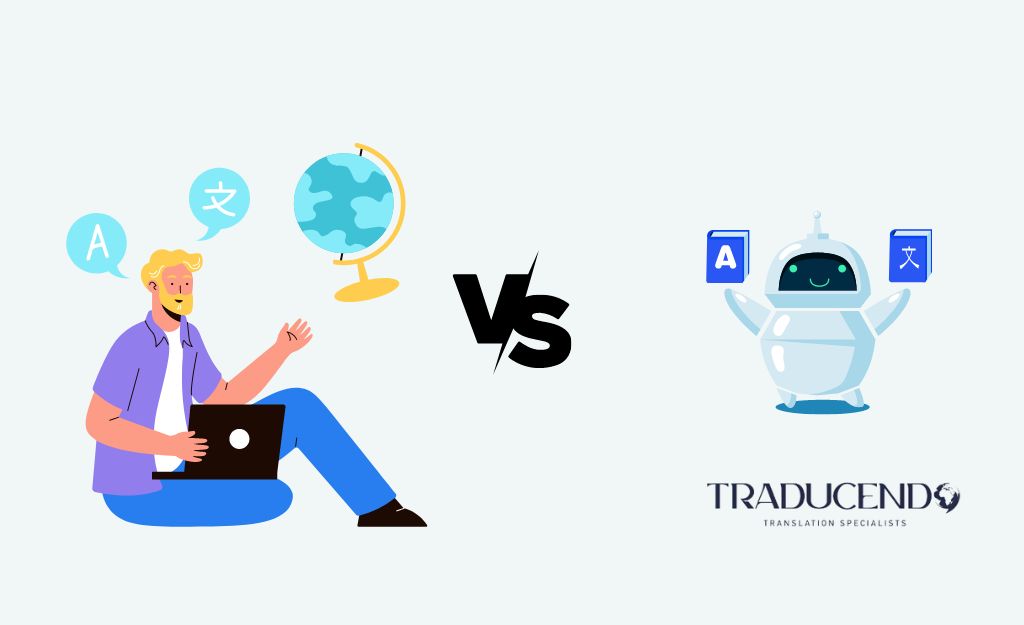This website uses cookies so that we can provide you with the best user experience possible. Cookie information is stored in your browser and performs functions such as recognising you when you return to our website and helping our team to understand which sections of the website you find most interesting and useful.
Dangers of using machine translation vs. professional translation

In today’s globalised world, professional translation services are the key to effective communication across languages and cultures. Whether you want to conduct business internationally or you simply want to communicate with people from other countries, you need translation! The quality of translations can have a significant impact on a company’s brand perception and its ability to achieve business goals.
In this post, we look at the dangers of using machine translation instead of a professional human translator, and why it’s important to invest in high-quality professional translations to ensure the success of your business.
What is machine translation?
Artificial intelligence (AI) is a branch of computer science devoted to creating systems and programs capable of performing tasks that require human intelligence, such as learning, decision-making and pattern recognition. AI is based on the development of algorithms and mathematical models that allow machines to ‘learn’ from input data and improve their performance over time.
Machine translation is a field of AI focused on creating systems that translate text from one language to another without the intervention of a human translator. Machine translation systems use machine learning algorithms and models to analyse the source text, identify linguistic patterns and generate a translation in the target language.
There are different approaches to machine translation, including rule-based translation, statistical translation and neural translation.
Rule-based machine translation
Rule-based translation uses grammatical and lexical rules to translate text.
Statistical machine translation
Statistical translation is based on the analysis of large amounts of data to identify translation patterns.
Neural machine translation
Neural translation is a more recent approach that uses artificial neural networks to process text and generate a translation.
Machine translation can be useful in certain situations, for example, if you want to translate a simple text or get the gist of a message. But it has significant limitations.
Machine translation systems are unable to fully understand the context and intent behind the original text, which can lead to inconsistencies and mistranslations. Plus, machine translation systems often struggle when it comes to handling slang, idioms and colloquialisms, which can result in unnatural or unintelligible translations.
Below we compare the two types of translation and show you why it’s vital to use a professional translation agency.
Accuracy and quality of translations
Machine translation can be quick and convenient, but it often lacks the accuracy and quality required for important situations, for instance when translating contracts or legal documents. Machine translation frequently misses critical cultural nuances, which can lead to misunderstandings and mistakes.
A professional translator, on the other hand, can accurately and effectively convey the tone, style and meaning of a text, using not only their language skills but also their understanding of the culture and customs of the target language. The accuracy and quality of a professional translation can be critical in business, legal and medical situations, where even the smallest of errors can have serious repercussions.
Confidentiality and security of translations
Machine translations typically use servers on the Internet, which can compromise data confidentiality. Translating confidential documents or trade secrets over an online platform could expose them to cybersecurity risks.
Conversely, a professional translator will ensure that confidential information is handled securely and confidentially.
Cultural adaptation in translations
Translation isn’t just about transposing words from one language to another; it’s also about conveying the culture and customs of the target population.
Professional translators have a deep understanding of cultural differences and can adapt the translation accordingly. For example, in some languages, it’s common to use different forms of address for different levels of hierarchy or familiarity. A professional translator will know how to adapt the translation to reflect these cultural differences.
SEO and translations
If you’re translating web content for SEO purposes, machine translation is not the best option. Machine translation doesn’t bother with SEO best practices, such as keyword selection or site structure optimisation. But a professional translator can ensure that the translated content is all geared up for SEO.
Brand image and translations
The quality of a translation can have a significant impact on the impression that customers and partners have of your brand. Machine translations can be full of errors and inconsistencies – not a great look if you want your brand to come across as competent and professional.
On the contrary, high-quality professional translations can enhance your brand image and boost your credibility in foreign markets.
Why is professional translation important?
Put simply, professional translation is a must if you want to tick all the right boxes in terms of:
- Accuracy
- Quality
- Confidentiality
- Cultural adaptation
- SEO
- Brand image
If you rely on machine translation, you could be putting your business at risk, especially if you are using it for confidential translations such as contracts and legal documents. Not only that, but the brand image you convey to customers and partners also can be affected by the quality of your translations.
It’s important to invest in high-quality professional translations to ensure the success of your business in today’s globalised, multicultural world.
Here at Traducendo, we pride ourselves on producing trusted translations tailored to our clients’ specific needs, helping them to achieve their business goals and communicate effectively with people across cultures and languages.

